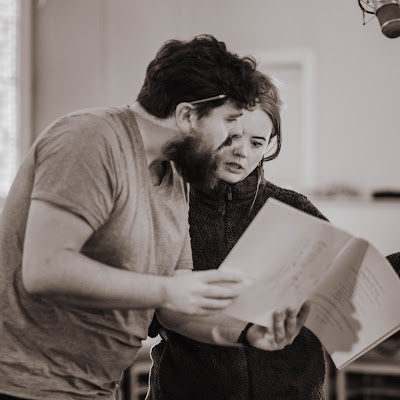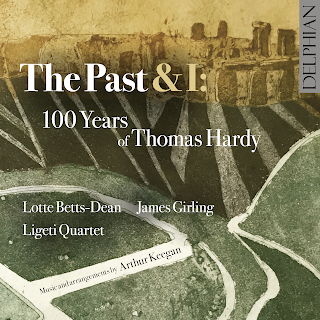The Past & I: 100 years of Thomas Hardy; Arthur Keegan: Elegies for Emma and String Quartet No. 1 ‘Elegies for Tom’, Derek Holman, Muriel Herbert, Britten, Imogen Holst, Gurney, Robin Milford, Finzi, Kerry Andrew; Lotte Betts-Dean, James Girling, Ligeti Quartet; Delphian
Reviewed 21 August 2024
Inspired by a letter from Thomas Hardy to Holst which was preserved by Holst’s daughter and gifted to Britten, Arthur Keegan combines two of his own powerful responses to Hardy with 20th century Hardy settings in new arrangements, superbly performed.
In 2019, composer Arthur Keegan had a residency at the Red House in Aldeburgh and was supposed to be writing an orchestral work. But he was shown a letter that poet Thomas Hardy had written to composer Gustav Holst, thanking Holst for setting his poems. Holst kept the letter in a book of Hardy’s poems, left it to his daughter Imogen, who in turn presented as a gift to Britten in 1952 who, in 1953 would set Hardy’s poetry in the cycle Winter Words. Increasingly drawn to Hardy’s poetry, Keegan would write two elegies based on Hardy’s words which form the bookends to a fascinating collection of original work and arrangements by Keegan exploring reactions to Thomas Hardy (1840-1928).
The Past & I: 100 years of Thomas Hardy on Delphian features Arthur Keegan’s Elegies for Emma and String Quartet No. 1 ‘Elegies for Tom’, Derek Holman’s Midnight on the Great Western, Muriel Herbert’s Faintheart in a Railway Train, Britten’s At the Railway Station, Upway, Imogen Holst’s Weathers, Ivor Gurney’s In the Black Winter Morning, Robin Milford’s If It’s Ever Spring Again, Gerald Finzi’s The Too Short Time, Kerry Andrew‘s The Echo Elf Answers, and Finzi’s The Shortening Days. Apart from the Keegan and the Andrew, all the remaining songs are arranged for the performers, mezzo-soprano Lotte Betts-Dean, guitarist James Girling and the Ligeti Quartet, by Arthur Keegan.
In life, Thomas Hardy showed little patience to his first wife, Emma, but poured regret, guilt and love into a series of poems after her death. Keegan’s Elegies for Emma for voice and guitar, takes a sequence of these in which Keegan tries to give Emma a voice (Hardy destroyed her diary after her death), six songs and an interlude that play without a break. ‘Days to Recollect’ creates a wonderfully evocative atmosphere, with Keegan’s appealing guitar writing complementing Betts-Dean’s voice. ‘The Walk’ is still evocative but more disturbing in atmosphere, whilst ‘Rain on a Grave’ is positively edgy with Betts-Dean almost angry at first. The interlude ‘I look into my glass’ begins with Betts-Dean reading the poetry, with Girling’s guitar recalling the opening of the cycle. ‘The Voice’ returns us to the haunting sound of Betts-Dean complemented by Girling’s appealing guitar playing, capturing the melancholy looking back, the sense of regret that the poetry creates. ‘She, to Him’ returns us to material from earlier in the cycle, yet creates something disturbing which leads us to the final section which returns to the opening poem, and we end, in a sense, where we began, with nothing learned.
 |
| Arthur Keegan and Lotte Betts-Dean at the recording sessions (Photo: foxbrush.co.uk) |
The following three songs all explore Hardy’s railway poetry, a nice example of the way Keegan’s selection of the works on the disc mines the various preoccupations in Hardy.
Derek Holman studied at the Royal Academy of Music with Eric Thiman and York Bowen, and in 1965 moved to Canada to live and work. Here we hear his Midnight on the Great Western, a poem best known in song form from Britten’s version, in Keegan’s arrangement for voice, string quartet and guitar. Holman’s song is very different from Britten’s, appealingly direct but with imaginative colours and commentary in the accompaniment. Guitar and string quartet is not the most obvious combination, but it works.
Muriel Herbert was encouraged during her life-time by composer Roger Quilter, and then Herbert’s daughter, the author Claire Tomalin, who wrote a biography of Thomas Hardy, would do much to make her mother’s songs available. Faintheart in a Railway Train is heard in a version for voice and string quartet that makes the song something rather special indeed.
With Britten’s At the Railway Station, Upway we come to Britten’s Hardy cycle, Winter Words. The song arranged by Keegan for voice and guitar. It is strange how by moving from piano to guitar, the song seems to become different, yet remains the same. It is partly, also, because we are hearing it with Betts-Dean’s touching mezzo-soprano performance rather than the usual tenor.
The next four songs turn from railways to that other British preoccupation, the weather, and its use as a metaphor. All are in Keegan’s versions for voice and guitar. Imogen Holst’s Weathers was written when she was just 19, and has a distinctly folk-ish feel to it, as if you had known the tune for ever.
Gurney’s In the Black Winter Morning, Milford’s If It’s Ever Spring Again and Finzi’s The Too Short Time, follow. The Gurney is touchingly melancholy, the guitar accompaniment bringing a distinctly lute-song-ish feel to Gurney’s writing. Milford’s song is delightfully perky, the guitar enhancing its insouciant wistfulness. The Finzi returns us to more sober melancholy, and darker intensity.
Kerry Andrew’s The Echo Elf Answers was written for the performers, Lotte Betts-Dean and James Girling, for this disc. This highly haunting song feels as it has a folk-song at its core, but around this melancholy wistfulness Andrew weaves something complex and fascinating. The final arrangement is Finzi’s Shortening Days for Betts-Dean and the Ligeti Quartet, an evocative farewell.
We end with Keegan’s String Quartet No. 1′ Elegies for Tom’. This takes Hardy’s poem Afterwards and creates a sequence of five movements inspired by lines from the poem, each movement titled with a line. Between these are option interludes for voice and string quartet based on Philip Larkin’s poem The Mower which is itself a response to Hardy. ‘Delicate-filmed’ is just that, thoughtful in feel, transparent and rather wonderful in texture. ‘1st Interlude’ is edgier with Betts-Dean making Keegan’s jagged settings of Larkin reall tell. ‘An eyelid’ is more rhythmic, intense at time, leading to the bleaker, slower ‘2nd Interlude’. ‘Nocturnal blackness’ is quite and intense, this dark night is mysterious and confounding. ‘3rd Interlude’ is again edgy, whilst ‘Full-starred heavens’ returns us to an earlier sense of time suspended. ‘4th Interlude’ is restless yet melancholy, leading to ‘A new bell’s boom’ which has Betts-Dean’s line continuing.
I found Keegan’s quartet writing here, very appealing and frankly was happy with it on its own without the interludes. Perhaps my approach to the interludes is disturbed by the fact that for copyright reasons, the words are not available in the CD booklet. But overall this is an intelligent and remarkable work, and it crowns a fine recital. Keegan has crafted a highly satisfying mix of old and new, with his arrangements making us see more familiar items differently. My own favourite remains his cycle for voice and guitar, but the whole recital is a lovely one, benefitting from superbly sympathetic performances.
Arthur Keegan (born 1986) – Elegies for Emma
Derek Holman (1931-2019) – Midnight on the Great Western
Muriel Herbert (1897-1984) – Faintheart in a Railway Train
Benjamin Britten (1913-1976) – At the Railway Station, Upway
Imogen Holst (1907-1984) – Weathers
Ivor Gurney (1890-1937) – In the Black Winter Morning
Robin Milford (1903-1959) – If It’s Ever Spring Again
Gerald Finzi (1901-1956) – The Too Short Time
Kerry Andrew (born 1978) – The Echo Elf Answers
Gerald Finzi – The Shortening Days
Arthur Keegan – String Quartet No. 1′ Elegies for Tom’
Lotte Betts-Dean (mezzo-soprano)
James Girling (guitar)
Ligeti Quartet (Freya Goldmark, Patrick Dawkins, Richard Jones, Val Welbanks)
Recorded 28-30 November 2023, St Mark’s Church, Portobello, Edinburgh
DELPHIAN DCD34307 1CD [67:06]
Never miss out on future posts by following us
The blog is free, but I’d be delighted if you were to show your appreciation by buying me a coffee.
Elsewhere on this blog
- Prom 40: Transcending limitations, Bach’s St John Passion from Masaaki Suzuki and Bach Collegium Japan – concert review
- Prom 37: intense contrasts thundering cannonades to personal intimacy, Antonio Pappano conducts Britten’s War Requiem – concert review
- Music is the best argument for its continued existence: John Largess of one of the USA’s most celebrated quartets, the Miró Quartet – interview
- More Buffy the Vampire Slayer than German Romanticism: Gothic Opera’s Der Vampyr at the Grimeborn Festival – opera review
- Substantial and satisfying listening: Stuart Hancock’s score for the new film, Kensuke’s Kingdom – record review
- White-hot dramatic impetus: Meyerbeer’s Le prophète on LSO Live uses a traditional version but captures the work’s essential drama – record review
- Songs from two golden ages: Nicholas Mulroy, Elizabeth Kenny & Toby Carr in a recital of effortless beauty – record review
- Everything is connected: Barbican Quartet on their debut album, Manifesto on Love, on Genuin label – interview
- Vivacity, humour & pathos: Opera Holland Park & Charles Court Opera in Gilbert & Sullivan’s The Yeomen of the Guard – opera review
- Prom 24: Vividness & virtuosity in an astonishing danced staging of Purcell’s The Fairy Queen – opera review
- Prom 23: riveting symphonic theatre from Benjamin Grosvenor, Edward Gardner & LPO in Busoni’s Piano Concerto – concert review
- The encounter that never was:
composers Alex Ho and Sun Keting on their collaboration on a new music
theatre work interweaving the stories of two very different Chinese
women – interview - Home









